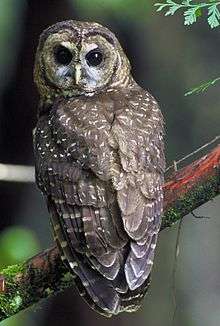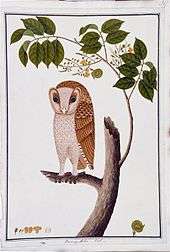Definify.com
Webster 1913 Edition
Owl
Owl
(oul)
, Noun.
[AS.
ūle
; akin to D. uil
, OHG. ūwila
, G. eule
, Icel. ugla
, Sw. ugla
, Dan. ugle
.] 1.
(Zool.)
Any species of raptorial birds of the family
Strigidae
. They have large eyes and ears, and a conspicuous circle of feathers around each eye. They are mostly nocturnal in their habits. ☞ Some species have erectile tufts of feathers on the head. The feathers are soft and somewhat downy. The species are numerous. See , , , , , , , under
Barn owl
Burrowing owl
Eared owl
Hawk owl
Horned owl
Screech owl
Snowy owl
Barn
, Burrowing
, etc. ☞ In the Scriptures the owl is commonly associated with desolation; poets and story-tellers introduce it as a bird of ill omen. . . . The Greeks and Romans made it the emblem of wisdom, and sacred to Minerva, – and indeed its large head and solemn eyes give it an air of wisdom.
Am. Cyc.
2.
(Zool.)
A variety of the domestic pigeon.
Owl monkey
(Zool.)
, any one of several species of South American nocturnal monkeys of the genus
– Nyctipithecus
. They have very large eyes. Called also durukuli
. Owl moth
(Zool.)
, a very large moth (
– Erebus strix
). The expanse of its wings is over ten inches. Owl parrot
(Zool.)
, the kakapo.
– Sea owl
(Zool.)
, the lumpfish.
– Owl train
, a cant name for certain railway trains whose run is in the nighttime.
Owl
,Verb.
I.
[
imp. & p. p.
Owled
; p. pr. & vb. n.
Owling
.] 1.
To pry about; to prowl.
[Prov. Eng.]
2.
To carry wool or sheep out of England.
[Obs.]
☞ This was formerly illegal, and was done chiefly by night.
3.
Hence, to carry on any contraband trade.
[Eng.]
Webster 1828 Edition
Owl
OWL
,Noun.
A fowl of the genus Strix, that flies chiefly in the night.
Definition 2026
owl
owl
See also: OWL
English

A northern spotted owl (Strix occidentalis caurina)

A 19th-century watercolour of an oriental bay owl (Phodilus badius), from the William Farquhar Collection of Natural History Drawings, National Museum of Singapore
Noun
owl (plural owls)
- Any of various birds of prey of the order Strigiformes that are primarily nocturnal and have forward-looking, binocular vision, limited eye movement, and good hearing. [from 8th c.]
- A person seen as having owl-like characteristics, especially appearing wise or serious, or being nocturnally active. [from 14th c.]
- The owl pigeon. [from 18th c.]
Derived terms
Terms derived from owl
|
|
Translations
a bird
|
|
See also
Anagrams
References
- ↑ Marlies Philippa et al, eds., Etymologisch Woordenboek van het Nederlands, A-Z, s.v. “uil” (Amsterdam UP, 3 Dec. 2009).
- ↑ Derksen, Rick (2008) Etymological Dictionary of the Slavic Inherited Lexicon (Leiden Indo-European Etymological Dictionary Series; 4), Leiden, Boston: Brill, ISBN 978 90 04 15504 6, pages 532—535
- ↑ Vladimir Orel, A Handbook of Germanic Etymology, s.vv. “*uwwalōn”, “*uwwǭ”, “*ūfaz ~ *ūfǭ” (Leiden: Brill, 2003), 436.